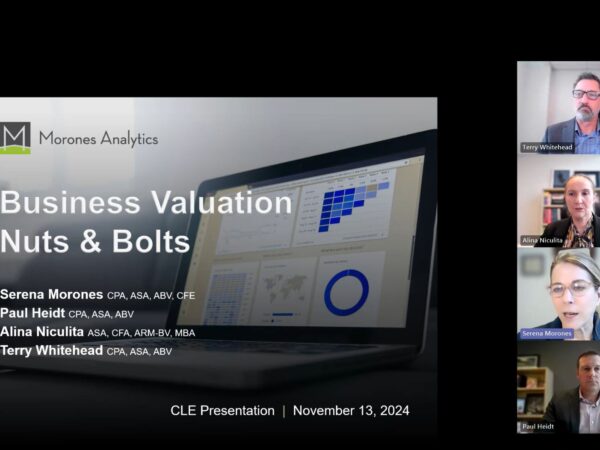

3 Questions From Attorneys at Our Recent Business Valuation CLEs
By Paul Heidt, CPA, ASA, ABV and Alina Niculita, ASA, CFA, ARM-BV, MBA
After recently presenting on business valuation at local law firms and the Multnomah Bar Association, we compiled a few common questions attorneys asked and have answered those questions below.
- What is cash flow and how is it used in business valuation?
ANSWER: In short, cash flow means what an owner can put in his or her pocket at the end of the day. According to the International Glossary of Business Valuation Terms, equity net cash flow is defined as those cash flows available to pay out to equity holders (in the form of dividends) after funding operations of the business enterprise, making necessary capital investments, and increasing or decreasing debt financing. Another type of cash flow is net cash flow to invested capital.
In a business valuation, appraisers calculate the subject company’s net cash flow, as it refers to the amount of cash that can be distributed to the owners. A normalized level of net cash flow is typically capitalized to determine value under the Income Approach.
- Why is an EBITDA (“earnings before interest, taxes, depreciation, and amortization”) valuation multiple often preferred in the Market Approach as opposed to a net income multiple?
ANSWER: The Price-to-EBITDA valuation multiple, which is often cited in the financial press, is used extensively in business valuation, specifically in the Market Approach, due to its ability to compare across different businesses. EBITDA presents a pure measure of the company’s earnings before consideration of how the company is financed (interest), how the company might be taxed (C-Corporation or S-Corporation) or what capital improvements or intangible asset investments might be underway that consume cash (depreciation and amortization). A net income valuation multiple on the other hand would include interest expenses, taxes, and non-cash charges and make comparing companies less accurate.
- Since many companies struggled financially during the Covid-19 pandemic, how are you handling those years when determining business value?
ANSWER: It is true that companies in some industries struggled during the Covid-19 pandemic, such as movie theaters, fitness centers, and restaurants, while companies in other industries (hardware stores, landscapers, etc.) thrived. When valuing companies that took a drastic hit or experienced a significant uptick during the pandemic, it is important to examine the company’s financial history prior to the pandemic and its performance since.
In the Income Approach, an appraiser determines a normalized level of cash flow for the subject company. While determining the normalized level of cash flow for a company significantly affected by the pandemic, appraisers may choose to put less weight on the pandemic years of 2020 and 2021 or ignore those years all together. The same procedure can be applied in the Market Approach with other earnings measures such as EBITDA (See Question2).
Many companies may also appear more profitable due to the one-time extraordinary income from the forgiveness of Paycheck Protection Program (“PPP”) loans in 2020 and 2021. Appraisers typically remove the PPP loan forgiveness income from the company’s profit and loss statement, thus adjusting the financials to a more normalized level of profitability.
Want more on this topic? See Answers to Top 3 Questions on Business Valuation Approaches.
To sign up for our firm’s CLEs on business valuation, or other topics including expert testimony, forensic accounting, and lost profits, please see our CLE offerings and contact Paul Heidt.
————————————————–

Paul Heidt brings close to 25 years of specialized experience in financial analysis and research. He has performed 250+ business appraisals for litigation, gift and estate tax planning, marital dissolution, business transactions, reorganizations and succession planning.
503-906-1583 | [email protected]
 Alina Niculita is a valuation and testifying expert who has specialized in business appraisal and appraisal review for litigation cases and business transactions for two decades. She has appraised hundreds of companies in diverse industries and sizes up to several billion dollars in revenue and testified in support of her opinions.
Alina Niculita is a valuation and testifying expert who has specialized in business appraisal and appraisal review for litigation cases and business transactions for two decades. She has appraised hundreds of companies in diverse industries and sizes up to several billion dollars in revenue and testified in support of her opinions.
503-906-1585 | [email protected]




